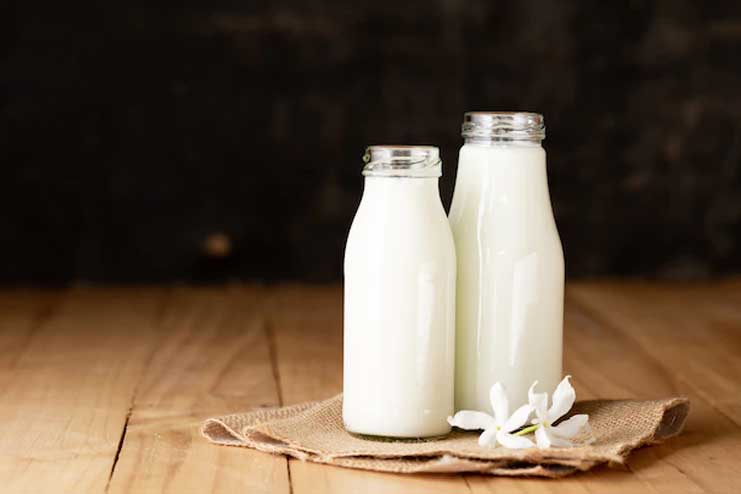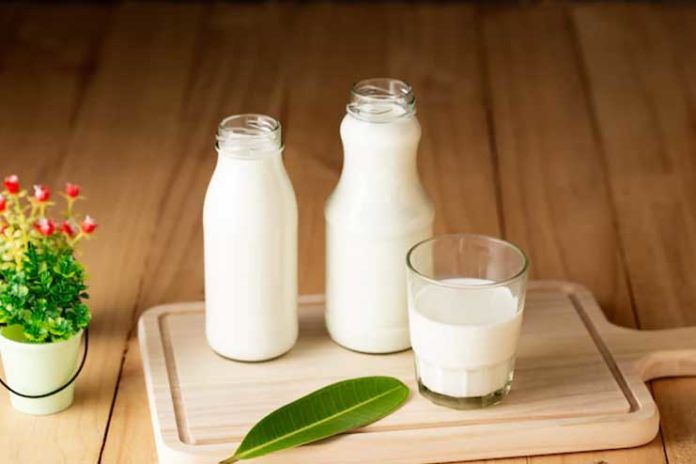AI Contribution
At HealthSpectra, we may use AI to refine grammar and structure, but every piece is shaped, checked, and approved by real people, our expert writers and editors, to ensure clarity, credibility, and care. Learn more..Affiliate Disclaimer
Some links in this article are affiliate links. We may earn a small commission if you make a purchase through these links, at no extra cost to you. We only recommend products we find useful to our readersSince childhood, our parents have encouraged us to drink milk every day, as it is considered one of the healthiest and most nutritious beverages. Milk is rich in essential minerals such as calcium, vitamin B12, vitamin D, proteins, good fats, potassium, and phosphorus.
Milk is recommended for people of all ages, whether in liquid form or as part of various food products. Consuming milk helps boost immunity and strengthen bones, which is especially beneficial for older adults. However, like anything, consuming it in excess can cause more harm than good.
Drinking large quantities of milk daily can lead to both minor and major health issues. Excessive milk consumption has been linked to an increased risk of some health problems, including a 44% higher risk of developing certain types of cancer.
Additionally, women who drink three or more glasses of milk a day may almost double their risk of cardiovascular disease. It’s important to understand how much milk is beneficial for your health and the potential side effects of overconsumption.
In this article, we will discuss the side effects of consuming too much milk and provide important information on how to balance your intake.
Side Effects of Consuming Too Much Milk
1. Bloating and Digestive Issues

Drinking too much milk can cause signs and symptoms that aren’t limited to those with full-blown lactose intolerance but can also affect others. Excessive milk consumption may lead to digestive issues such as bloating, cramps, and diarrhea.
If your body struggles to break down lactose properly, it can cause a condition known as a “leaky gut,” where bacteria and toxins leak through the intestinal wall. This can result in gassiness and other digestive problems.
You may have noticed that consuming milk makes you feel fuller, but when consumed in excess, it can disrupt digestion. It can trigger the release of certain enzymes into the bloodstream, potentially leading to gastrointestinal issues.
According to research (R), the inhibitors found in bovine milk can cause imbalances in digestive enzymes and lead to the overproduction of trypsin, an enzyme that interferes with intestinal cell function.
2. Nausea

Many people have difficulty digesting milk and dairy products due to lactose intolerance. This condition occurs when the body doesn’t produce enough of the enzyme needed to break down lactose, the sugar found in milk. According to the American National Institutes of Health, about 65% of adults have some form of lactose intolerance.
Nausea is one of the most common side effects of lactose intolerance, and in some extreme cases, vomiting can occur after consuming dairy products such as milk, ice cream, or cheese.
If you suspect you have lactose intolerance but still wish to consume dairy, there are plenty of alternatives available, including lactose-free milk, ultra-filtered milk, lactose-free yogurt, and plant-based milk substitutes.
3. Feelings of Tiredness

Consuming too much milk in a day can contribute to a condition known as “leaky gut.” The A1 casein protein found in dairy milk can sometimes lead to inflammation, which may increase the permeability of the gut lining and disrupt the balance of microbes in the gut. This imbalance, known as microbiome dysbiosis, results in a higher number of harmful bacteria compared to beneficial ones.
Recent studies have linked leaky gut syndrome with symptoms such as chronic fatigue and lethargy, where individuals experience persistent tiredness that isn’t relieved by rest.
As a result, many people with milk allergies are advised to try A2 milk. A2 milk is free from the A1 protein, making it a potential alternative for individuals with milk intolerance.
4. Skin Breakouts

Consuming excessive amounts of milk can lead to allergies and breakouts on your face or other parts of your skin. It may be time to reassess your diet if you frequently notice red acne spots or rashes.
Some milk products available today are treated with growth and milk-production-regulating hormones, which may contribute to inflammation and worsen skin issues.
Studies suggest that consuming skim milk is linked to an increase in acne due to its higher processing and hormone levels (R).
However, consuming full-fat milk, which contains more calories, is less likely to have hormones. Yet, both skim milk and full-fat milk contribute to breakouts.
When your body becomes intolerant to certain substances, it can lead to inflammation, which may manifest through your skin. This inflammation can worsen acne by disrupting insulin regulation.
Ultimately, limit your dairy intake if you are prone to acne. Monitor your skin’s response to different milk products.
Related Article: Side Effects of Almond Milk
5. Decreased or Fragile Bone Mass

Milk is commonly believed to be good for building stronger bones, with its calcium content playing a key role in bone health. However, consuming more than the recommended amount can have adverse effects and may cause more harm than good.
Research has shown that excessive milk consumption can actually make bones brittle and more fragile. A 2014 BMJ (R) study found that older men who drank little milk were less likely to suffer from broken bones or inflammation compared to women who consumed more milk.
Additionally, a 2015 study published in The Journal of Nutrition (R) found that consuming dairy products increased low-grade inflammation in some German adults. Women who drank three or more glasses of milk daily had a 16% increased risk of bone fractures and a 60% higher risk of hip fractures.
If you notice changes in your bone density due to milk consumption, consider opting for dairy-free alternatives that also provide calcium. This can help ensure your body’s safety and prevent harm, especially since women tend to be more affected by this issue.
6. Symptoms of Cardiovascular Diseases

Drinking too much milk has been linked to an increased risk of death in both men and women, as well as a higher risk of cardiovascular disease and cancer in women, according to research published in the BMJ in October 2014 (R).
The study found that women who drank three or more glasses of milk daily had nearly double the risk of death and cardiovascular disease, along with a 44% increased risk of cancer compared to those who consumed less than one glass per day.
For men, the overall risk of death increased by about 10% when they drank three or more glasses of milk daily.
If you have previously experienced chest pain or have suffered from a stroke or heart attack, it may be wise to consult your doctor about whether you should continue drinking milk.
Additionally, opting for foods low in cardiovascular risk can help maintain your heart health.
7. Memory Issues or Foggy Brain

One side effect of consuming too much milk is experiencing brain fog, making it difficult to concentrate or express your thoughts clearly. While brain fog itself isn’t a medical condition, it can be associated with symptoms like memory problems, difficulty focusing, and impaired retention and concentration.
According to experts, the casein content in milk, which is present in high quantities in dairy products, can interfere with certain brain receptors and send false signals to the brain. Consuming excessive amounts of dairy may also increase the likelihood of developing mental health issues as one age.
8. Cancer

Consuming too much milk may be linked to certain types of cancer, such as prostate or breast cancer, although there is limited evidence to support these claims.
Most of these studies are empirical, meaning they observe trends in milk consumption and illness over time, but more high-quality research is needed to fully understand the potential connection.
9. Weight Gain

While milk is rich in vital vitamins and minerals like calcium, potassium, and vitamin B12, its high fat content makes it calorie-dense. Full-fat dairy has, of course, been reported to improve some metabolic indices and increase meal satisfaction. However, this can often contribute to the overconsumption of calories.
Studies show that weight gain will occur only when calorie intake is greater than energy expenditure (R). It doesn’t matter where those calories come from. Since dairy products are so calorie-rich, full-fat varieties are especially prone to adding up quickly.
For instance, a cup of whole milk has around 150 calories, and cheese or cream-based products can have even more.
Moreover, although certain studies indicate that high-fat dairy does not cause weight gain (R), this does not rule out the fundamental law of calorie balance.
Overconsumption of any calorie-rich food item, such as milk and dairy products, can prevent weight loss and lead to weight gain if it is not consumed in moderation. Therefore, controlling portions and conscious dairy consumption is crucial for losing or maintaining weight.
10. Chronic Inflammation

The intake of too much milk can cause fullness, bloating, and discomfort in the digestive system, especially in people who are lactose intolerant or sensitive to dairy. More than that, the possible contribution of milk to inflammation is an increasingly interesting topic.
Milk is an inflammatory food due to its dual nature. While it contains calcium, an alkaline agent that is beneficial to the bone, it also contains proteins and acids that cause inflammatory responses in some people.
Casein, the major protein in milk, is involved in inflammatory reactions among people with sensitivities or autoimmune conditions. Moreover, dairy products may form advanced glycation end products (AGEs) during digestion, which can further worsen inflammation and contribute to the development of arthritis and other chronic diseases.
Although milk is traditionally believed to be a bone-strengthening food, new research indicates that its inflammation potential outweighs its other benefits (R). Numerous other nutrients are also available from plant-based foods, like kale, chard, almonds, and figs, which contain calcium and have no pro-inflammatory effect.
In addition to improving bone health, these foods reduce the chance of chronic inflammation, which is associated with diseases such as cardiovascular disease, diabetes, and autoimmune diseases.
Related Article: Everything You Need to Know About Acid Reflux
11. Poor Skin

Your skin plays a significant role in making you feel confident and beautiful; skin health is just as crucial as your overall health. How is it important, you may wonder? The truth is that you only have healthy skin when your internal systems are functioning properly.
As the largest organ of the body, the skin helps eliminate toxins that the internal organs, like the liver and digestive system, may struggle to remove. This is especially true when the body is unable to properly detoxify.
When you consume too much milk or dairy, even in small amounts for some people, the skin often bears the brunt of the impact. Acne, redness, splotchiness, or dull and unhealthy skin are common signs.
Many individuals notice significant improvements in their skin within just a few days of cutting out dairy. This happens because the body’s internal systems are better able to detoxify, and the skin no longer has to compensate for the excess toxins.
How Much Milk Should You Consume?

Now that you know the side effects of consuming too much milk, you might wonder how much one should consume daily. Let’s establish some general guidelines for how much milk you should drink each day.
According to a report from the United States Department of Health and Human Services, it is safe for individuals over the age of nine to consume up to three cups of milk daily.
This recommendation is based on the fact that milk and other dairy products are excellent sources of calcium, phosphorus, vitamin A, vitamin B12, protein, potassium, zinc, choline, magnesium, and selenium. However, it is not necessary to drink all three cups of milk to receive the nutritional benefits of milk.
Individuals who must avoid milk entirely, particularly those who are lactose intolerant, also suffer from lactose intolerance. This condition results from a deficiency of an enzyme called lactase, which is responsible for breaking down lactose in milk and is essential for its proper digestion.
Conclusion
Although milk is known to contain several essential vitamins and minerals, overconsumption can bring on a variety of health complications. From digestive problems and skin breakouts to a heightened risk of chronic diseases like heart disease and cancer, knowing the possible side effects of consuming too much milk is quite crucial.
Moderation is the key—milk is full of nutrients, but too much can be bad for your body in the long run. Being mindful of your intake and considering alternatives when necessary will allow you to enjoy the benefits of milk without risking negative health consequences.
Always remember that maintaining a balanced diet is the best approach for overall well-being.
-
Jun 2022Written by Vrushali Gavali
-
Jan 2025Edited by Lakshmi Gayatri



















